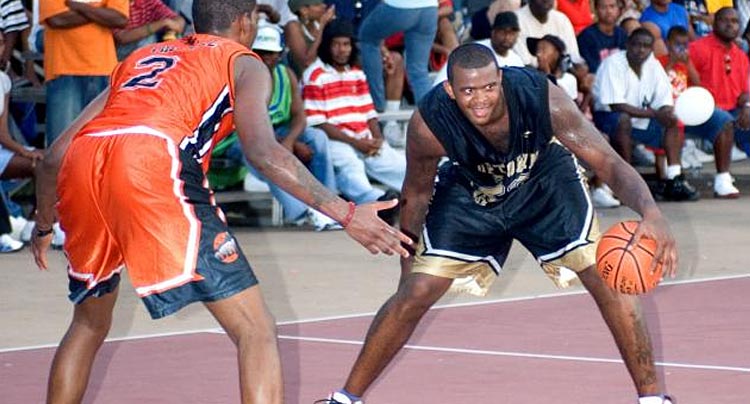
Contains a typical rise-and-fall framework, but packs more of an emotional punch than most of its kind.

Contains a typical rise-and-fall framework, but packs more of an emotional punch than most of its kind.
How is it possible that the #1 high school basketball player in America never ended up playing in the NBA? You probably never even heard of his name before. The documentary Lenny Cooke attempts to answer this question by containing a typical rise-and-fall framework, but packs more of an emotional punch than most of its kind. Lenny Cooke was extremely gifted at playing basketball–but like most teenagers his age–also had the downfall of looking for every possible shortcut. But one of his other rare talents is his relatively modest attitude, making it impossible not to cheer for him.
Back when Lenny Cooke was in high school he ranked just as high as players that went on to have successful careers in the NBA (Amar’e Stoudemire, Carmelo Anthony, and even LeBron James). In fact, he was ranked the #1 basketball player in the country for his age at one point. The opening montage features clips of Cooke dominating basketball camps that were attended by these future professional all-stars. It seemed all but inevitable that Cooke would someday be an all-star himself, but the fact that he does not is what makes this story so fascinating.
In 2001, one year before Cooke was eligible to be drafted, him and his closest friends gathered around his television set to watch the NBA draft. That draft was the first in NBA history to have the #1 overall pick be a person straight out of high school (Kwame Brown). And he was not the only one. The second and fourth overall picks were also fresh high school graduates. It was a year that shocked critics of the sport because not only are these young teenagers who have no financial wisdom suddenly becoming millionaires, but they are being lured away from pursuing a higher education at the collegiate level. It would be another five year before the NBA eventually changed its rules so players could not be drafted to the league straight out of high school.

Instead of relying on mostly “talking head” interviews, Lenny Cooke benefits from showing exciting footage of basketball camps and amazing behind-the-scenes material from a camera that followed Cooke around everywhere. This intimate portrait of him makes the whole situation all the more heartbreaking when his name was not called during the 2002 draft. But what really makes the viewer root for Cooke is that he remained fairly humble about his future prospects from the very beginning. When someone would ask him if he will be playing in the NBA, he would respond with “hopefully” instead of a self-assured answer like “absolutely”.
What makes the story of Lenny Cooke so much better than others is that his story is not a clichéd one about a kid with a bright future ahead who tragically turned to violence or something of that nature. As Robert DeNiro preached in A Bronx Tale, “the saddest thing in life is wasted talent,” which is exactly why Cooke’s story so poignant. Lenny Cooke provides the stark contrast between what his life nearly was and what his life currently consists of–visually evident by the amount of weight he gains over the years. It is unfortunate that the documentary ends with Cooke essentially pleading you to feel bad for him, because the story alone accomplishes that. Even though the final ten minutes becomes more of a pity party for Cooke than anything else, the rest of the documentary is compelling enough to make up for it.